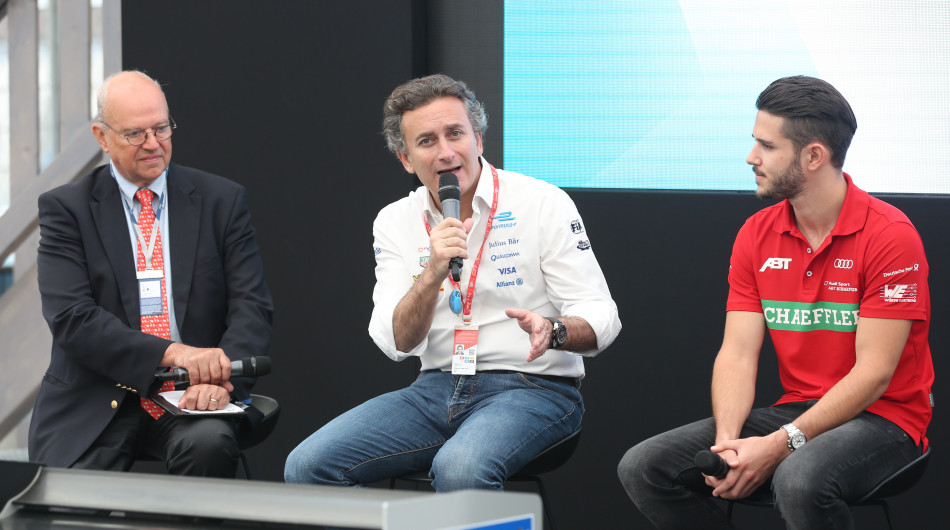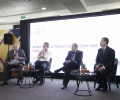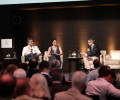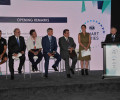FIA Smart Cities Forum in Berlin offers a unique platform to discuss new directions in urban mobility
On 9 June, Thierry Willemarck, FIA Region I President, Alejandro Agag, CEO of Formula E Holdings LTD and Daniel Abt, professional Formula E driver, opened the FIA Smart Cities Forum, the second in the series of three Forums, held in the framework of the FIA Smart Cities Initiative. Hosted in the FIA Formula E venue in Berlin, the Forum gathered mobility experts from international organisations, city authorities and industry players

Today more than ever before, cities require highly strategic transport planning. Innovative information and communication technologies offer a solution to outbalance mobility supply and demand in a more efficient manner. Users no longer need to adapt their travel patterns to existing modes and times of transit as they can now benefit from more flexible, customised and easily adaptable mobility solutions. Carpooling schemes, bike-sharing platforms, subscription to multi-modal transport services, real-time apps for monitoring traffic volumes are only some of the components of new urban mobility solutions, currently piloted by many European cities. “Delivering the benefits of new mobility services to a wide range of actors requires an ecosystem approach in which regulatory, technological and social components are well aligned. The FIA European Member Clubs are strongly committed to this new vision of mobility and its impact on the transformation of our cities. ” stated Thierry Willemarck, FIA Region I President.
New mobility solutions are tightly linked to new trends in the automotive sector, including electrification and vehicle automation. Lew Fulton, from the Institute of Transportation Studies, University of California, presented a future scenario of electric vehicles deployment. He explained that a strong e-mobility ecosystem is set to profoundly enhance the way people reach their destinations without jeopardizing environmental and social objectives. Berlin, hosting the FIA Formula E race for the 3rd time, is the good example of a city striving for a long-term zero emission mobility vision. "eMo", the German electric mobility agency, explained that Germany aims at becoming the lead market and main provider for electric mobility by 2020.
Ian MacBeth, from the Transport for London, reflected on London approach for scaling up efficient mobility solutions. By putting in place appropriate regulatory measures to implement necessary sustainability changes, many of the European cities make electric mobility a founding pillar of national environmental, technological and economic development strategies.
All speakers appeared to agree that the future of smart mobility solutions is two-fold. Firstly, there must be an open and collaborative market place to allow relevant stakeholders to share expertise, create synergies and optimise the use of technologies when delivering a new mobility service. Secondly, transport decision-makers should foster demand-focused policies to define a pathway for growth and enhancement of urban transport. The deployment of new technologies largely depends on the appropriate regulatory framework: the experts of the FIA Smart Cities Forum have reiterated this point saying that a link between public and private transport can ultimately result in a harmonized real-time multi-modal transport system which will make our cities more livable. “In the city, mobility is an integral element of other urban sectors: reliable and efficient transport systems underpin every part of the urban ecosystem” said Philippe Crist from ITF. “The International Transport Forum advocates for a more inclusive allocation of transport capacity so that no city dweller is left without an access to a suitable mobility service”.
The deployment of electric mobility, however, doesn’t necessitate large scale policy developments – it can also be carried out in a more narrowly focused dimension. Roxy Tacq, a policy manager from ANWB, the Royal Automobile Club from Netherlands, shared the experience of the CycleRAP programme aimed at raising awareness on safe cycling in cities. To assess the safety and the quality of bicycle infrastructure, electric bicycles are equipped with cameras collecting data to assess hazards on cycling lanes. Those data are then analysed with the purpose to help finding easy and low cost measures to fix and improve existing infrastructure systems. Another real-life example was shared by Jorg Beckman, from the Touring Club Suisse, a FIA Member Club. Mr Beckman introduced the Carvelo2go programme, an e-cargo bike sharing scheme piloted in different cities in Switzerland as a concrete solution to transform user mobility patterns and help them using alternative mobility modes in a more efficient manner. “Smart sharing will unlock the efficiency of future urban mobility systems”, he said. “What we need to focus on is the transition period to the model where car-sharing services are cost-effective, easily accessible and carefully regulated”, he added.
Another dynamic session of the Forum was the presentation of the winner of the Berlin edition of the FIA Smart Cities Global Startup Contest. Created to identify, support and invest in the most successful startups empowering Smart Cities, the contest is open to visionary entrepreneurs. Selected by a jury of international experts, the winner of the Berlin contest went on stage to present “On truck”, a service currently implemented in Madrid and Catalonia, aiming at modernising and facilitating the transportation of goods.
Discussions of the FIA Smart Cities Forum have reiterated the fact that smart mobility services have the potential to deliver benefits to the operation of cities and well-being of their citizens. Governments and mobility service providers should stay mindful about the impact of new mobility services on the broader transport system and its potential to contribute to the growth of the smart city ecosystem.
About the FIA Smart Cities Initiative.
On the path to reaching sustainable development targets, transport authorities seek innovative solutions to meet a growing mobility demand and tackle existing urban mobility issues: pollution, congestion and road safety hazards are some of the problems cities face in the process of rapid urbanisation.
The FIA Smart Cities initiative was launched to encourage the relevant stakeholders to address these pressing concerns and discuss potential solutions to fill the gaps in modern mobility systems.
The FIA Formula E platform provides a unique arena for the FIA Smart Cities Initiative along with the FIA’s expertise in its complimentary pillars of Mobility and Sport
The initiative includes the Forums, a Cities Award and a Start Up Global Contest. Click here to learn more.

 Facebook
Facebook Twitter
Twitter






